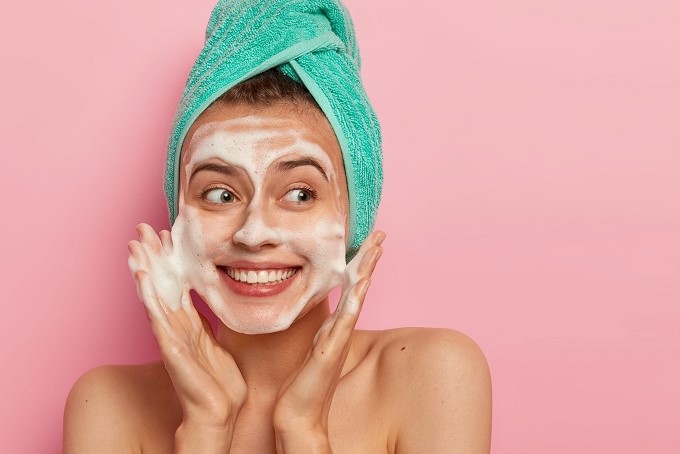Do you find yourself with a little extra time on your hands these days? For many people, the coronavirus pandemic (COVID-19) has had the consequence of more time spent at home. Whether you’re trying to fill the hours or looking for a way to relax during this stressful time, caring for your skin can help you do both. At the Center for Aesthetic and Laser Medicine in Scottsdale, Arizona, U.S. Dermatology Partners physician, Dr. Jennifer Sawaya, has been encouraging patients with extra time to consider boosting their skin care at home. Dr. Sawaya says, “Stress releases higher levels of hormones, like cortisol, into our bodies, which in turn causes inflammation. This inflammation can trigger chronic skin conditions like acne, eczema, and psoriasis. For those with perfectly healthy skin, stress can leave you with new irritation, swelling, and breakouts. Taking a little extra time to care for your skin will offer the two-fold benefit of improving your skin health and helping you to relax and de-stress.” In this blog, Dr. Sawaya walks through some basic tips for developing and maintaining a good at-home skincare routine during the COVID-19 pandemic and beyond.
Related: How to Build a Skincare Routine
Basic Skin Care – For Your Face
If you have a little extra time to spend on skincare right now, it may be a good time to develop some better habits when it comes to caring for your skin. Dr. Sawaya recommends, “You can spend as much as an hour or as little as ten seconds on your skin, depending on your goals and what’s important to you, but for most people, a simple morning and evening routine is effective. At the end of the day, you know your skin and what will work for your schedule. Find a morning and evening routine that works for you and stick with it consistently.”
Morning Routine
- Wash your face – Use a gentle cleanser. You probably don’t have a lot of sweat, dirt, or other gunk to remove in the morning. You’re simply washing away oil and dead skin cells to make room for new, healthier cells. Find products with minimal ingredients that are gentle on your skin.
- Apply the extras – If you have a treatment for a specific skin condition (acne, eczema, psoriasis, etc.) apply these after you wash. You can also apply products like antioxidants or other antiaging serums at this point.
- Moisturize – Apply a good moisturizer for daily wear. Depending on your skin type, this may range from a lightweight water-based moisturizer to a thicker cream.
- Sunscreen – You can apply a separate sunscreen or use a moisturizer that has built-in sunscreen as long as the SPF is greater than 30.
- Cosmetics – If you wear cosmetics you may apply them as you normally would once your moisturizer and sunscreen have had a chance to fully absorb into your skin. Starting your cosmetic application with a primer can help smooth the skin surface and protect your skin from the potentially harsh agents in many makeup products.
Nighttime Routine
- Wash your face – If you wear makeup, make sure you completely remove these products, using an appropriate makeup remover, micellar water, or other product that allows you to rid your skin of cosmetics without needing to scrub and tug at your face. Then, you can use a simple, gentle cleanser to wash your skin.
- Exfoliate (periodically) – Once or twice a week you should exfoliate your skin to remove the dead cells that could clog pores. People with eczema may want to skip exfoliating or talk to their dermatologist about good options for eczema-prone skin. Your dermatologist will recommend avoiding coarse exfoliating products no matter what your skin type as these can cause unnecessary inflammation. Look for enzyme or fruit acid-containing exfoliators or fine scrubs instead.
- Apply the extras – If you want to apply an antiaging, retinoid, or a product with growth factor and peptides to encourage cellular renewal, this is the time to do it. Many nighttime moisturizers and eye creams have these ingredients built in, so you may want to ask your dermatologist for a product recommendation that can offer these antiaging and antioxidant benefits without an extra step.
- Moisturize – At nighttime, you should be using a heavier moisturizer to really saturate your skin as you sleep. Thick, cream moisturizers and overnight masks can help replenish your skin’s hydration after a day of stress and damage.
- Get your beauty sleep – Seriously. Your skin (and all of your cells) are repaired and replaced during sleep, so get plenty of rest.
Related: 5 Best Ways to Take Care of Your Skin
Basic Skin Care – For Your body
Often, people focus on the majority of their attention around caring for the skin on the face. But the skin is your body’s largest organ and covers more than just your face. So, taking care of the rest of your body is just as important for your skin health.
Daily Whole Body Skincare Routine
- Get clean – We all want to lather up with those wonderful smelling, perfumed body washes, but these products can irritate the skin. Instead, use a gentle cleanser for daily cleaning. If you want to enjoy the fun fragrances (providing they don’t irritate your skin), add a small amount to your gentle cleanser to provide the fragrance without unnecessary chemicals.
- Exfoliate – Like exfoliating your face, you should be aware of your individual needs and avoid excessive exfoliation. Once or twice a week is more than enough exfoliation for almost everyone. The skin on your body is a little hardier than the face, so you can use a scrub such as a sugar or salt-based option if your skin is able to tolerate it. In addition, dry brushing the skin prior to showering may be helpful to remove dead skin cells and stimulate circulation. Otherwise, talk to your dermatologist about gentler exfoliating options for the whole body. Remember that areas like the elbows, knees, and feet tend to have significantly more skin buildup, so pay special attention when you exfoliate these areas.
- Stay moisturized – Immediately after you bathe, you should apply a good whole body moisturizer. This helps to capture the benefits of the moisture surge you get from showering and lock in this added moisture. If you have very dry skin, you may want to apply a moisturizer at nighttime too and use a cream-based moisturizer rather than a lotion.
Sun Protection – Every Day
Most of us are spending more time enjoying the great indoors during the COVID-19 pandemic, but you may not realize just how often your skin is exposed to UVA/UVB rays without ever setting foot outside. Dr. Sawaya says, “One of the things that most people aren’t aware of is that office buildings typically have tinted windows. This significantly reduces sun exposure compared with the amount of UV light allowed through our non-tinted windows at home. Additionally, many of us are spending more time in front of our TV, computer, and smartphone screens, and the blue light from these devices has been shown to be damaging to the skin as well. Even if you’re staying inside, you should still apply sunscreen at least to your face and neck, which receive the greatest exposure. Many moisturizers now have an SPF built in, and this is a quick, easy way to keep your skin safe on a regular day.”
Sun Protection – Special Circumstances
Hopefully, we’re all staying safe and healthy indoors right now, but if you are going to be spending time outdoors (maybe now is the perfect time to finally plant that garden), you should be wearing more sunscreen. According to Dr. Sawaya, “Most people are great at applying sunscreen once when they head out for a day in the outdoors, but many of us aren’t great at reapplying. You should be applying about two ounces of sunscreen to cover all exposed areas at least every two hours. If you’re outside for longer periods, taking a break every two hours to relieve your skin from constant sun exposure will be beneficial, and give you an opportunity to reapply your sunscreen. Don’t forget to cover places like exposed parts of the scalp and the back of the neck either with sunscreen or a hat. If you are swimming, it is important to reapply more often including every time you get out of the water.”
Other Factors that Impact Skin Health
In addition to keeping up with your daily skincare routine, there are other healthy habits that can help you keep your skin clear looking and feeling great, including:
- Diet – While there is a lot we don’t yet understand about the connection between diet and the skin, for many people it is clear that eating certain foods can lead to flareups and breakouts. There is early scientific data to suggest that foods containing dairy, gluten, and processed sugar may be particularly inflammatory for the skin. If you know specific foods seem to cause skin health issues for you, avoid these. In general, it is best to eat a blend of nutrient-rich foods high in antioxidants that will feed your cells and help keep your skin healthy.
- Hydration – Moisturizing is an essential part of skincare, but it should really start from the inside out. By drinking plenty of water, you keep your cells hydrated and reduce dryness on the surface of the skin.
- Exercise – For those who struggle with breakouts, exercising may seem like the cause of skin health issues, not a way to improve them. As long as you take the time to shower and wash your face after exercising, it can help you to maintain better overall health, and the increased blood flow nourishes skin cells, leading to more frequent cellular turnover and healthier appearance.
- Sleep – Our bodies repair and renew cells when we rest. If you’re not getting adequate sleep, you may start to see skin appearing dull, the thin areas under the eyes look darker, and wrinkles and fine lines may be more noticeable. Beauty sleep is real, and we all need plenty of it to replenish our skin cells!
Visit a Dermatologist for a Custom Skincare Routine at Home
Right now, many of our patients are at home for longer periods of time due to the COVID-19 pandemic. If you’re able to spend a little more time on your skincare routine, the U.S. Dermatology Partners team is here to support you. For non-emergency and non-urgent skin health concerns, we’re offering quick, easy teledermatology online appointments. Getting recommendations to improve your skincare routine and find specific products that meet your needs is an ideal use for these virtual office visits, and our team would love to hear from you.
To get started, simply complete our teledermatology request form. A member of our team near your home will be in touch soon to discuss the details.
Find a location near me
or


